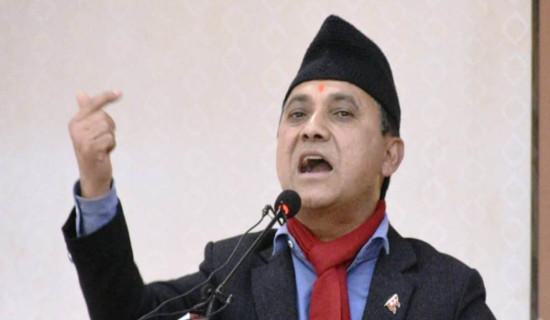- Saturday, 17 January 2026
Ripples Of China’s Two Sessions
All eyes were on China last week as Beijing was abuzz with hustles and bustles of the ‘Two Sessions’. The ‘Two Sessions’ are the annual gatherings of the National People’s Congress, (NPC) and Chinese People's Political Consultative Conference (CPPCC). The NPC is China’s supreme legislative body or parliament while the CPPCC an apex political consultative council having more advisory, supervisory and coordinating role. In China, the two sessions are always significant political events. But the events are more significant this time as these bodies have made political and policy decisions having greater ramification on China’s internal political and economic life as well as international landscape at a time when China is growing at a faster speed to challenge the west-dominated world order and create the new one.
The NPC elected Xi Jingping country’s President, General Secretary of the Communist Party and Chairman of Central Military Council for third term. Premier Li Keqiang departed and Li Qiang got elected new premier, while Han Zheng was elevated to the position of vice president. Zhao Leji was endorsed as chairman of the 14th National People's Congress and Wang Hening as chairman of the CPPCC. The new team has taken up the huge responsibility of shaping China’s future for the next five years, with which expectations are high at home and scepticisms abound in the western world.
Diverse picture
With Xi Jinping cementing his position in the leadership steering a strong team of loyalists, analysts and experts alike are trying to paint a diverse picture of China’s future. While the United States and allies designate China as an acute threat and tend to portray a grim picture, full of optimism abounds in the rest of the world seeking to turn China’s rise into opportunity for better and cooperative world order. Western analysts are of the view that China may soon enter into an economic slump, political crisis and international conflict. With economic slowdown, according to them, political disgruntlement and dissatisfaction may ensue disturbing internal cohesion, which may force Chinese leadership to enter into conflict with external powers in the region seeking to divert domestic attention.
China watchers, who have studied and understood Chinese history, society, system national character and behaviour, call such analyses and predictions too naïve, surficial and mere wishful thinking rather than based on ground reality. China is world’s longest continuing civilisation with over 5000 years history and has its unique national character and features, which are rare in other societies. This continuity of history, national sentiments and social, political and moral systems and values have made China what it is today and have bound Chinese people together into a strong and proud nation. Chinese society values community spirit and togetherness rather than western individualism.
Chinese society is based on oriental and Confucian wisdom that values more for community rights and welfare. Similar case is with the meaning and norms of democracy. China claims that there cannot and should not be a single model of democracy and different countries may have different models of democracy. China calls its political system as Chinese model of democracy. China’s impressive economic growth accompanied by development in all sectors is definitely a miracle. This is neither an overnight event nor simply an accident. Chinese call these achievements as being rooted in progression of the system. This is the result of decades of meticulous planning, arduous execution and monitoring and vision of different generations of leadership.
China begins the journey of modernisation with 1949 revolution. Mao Zedong led the revolution and established a new kind of political system in China laying the foundation of modern China and socialism of China’s unique character. Mao didn’t copy other country’s model even during the revolution and Chinese revolution was based on China’s own context and character. Thus, the path of China’s socialism building too has its own characters which it calls ‘socialism with Chinese characteristics’. The second phase of China’s modern history and modernisation begins with Deng Xiaoping’s rise in 1976. Deng is the architect of China’s reforms and opening up. Leaders after Deng namely Jiang Zemin and Hu Jintao gave continuity to the process Deng initiated.
New phase of history begins with the rise of Xi Jinping in the leadership in 2013. Xi has pursued the policies and mission set forth by both Mao and Deng which has transformed China into a modern socialist country. The last ten years or Xi’s two terms as president of China have been successful as China has not only made miraculous progress in economic and other sectors but has also stood in the community of nations as a proud and powerful country. Under Xi, China has risen as world’s second largest economy and powerful country to be able to challenge the sole superpower United States but at the same time it has achieved tremendous success in eradication of poverty, effecting physical developments and delivery of services back home.
Challenges
China’s phenomenal rise to great power status and its ability to lift more than 800 million people out of poverty in a period of two decades are definitely most important developments of the 21st century world. Xi is at the helms for the consecutive third term. Now it is to be seen what course China will take in future. The road ahead is definitely not rosy. China will have to face bumps and problems ahead. China is already facing slowdown in economic growth, demographic imbalance with decline in the working age population and most notably hurdles likely to be created by international adversaries.
Antagonistic international powers may continue to unleash barrage of propaganda and try to fabricate an atmosphere to push Beijing into military conflict in the neighbourhood. Tensions are already boiling in the Taiwan Strait. China’s relations with some neighbours like Japan and India are not cosy. South China dispute still remains unresolved. If conflicts flare up in the neighbourhood and once China gets involved, its adversaries may try to play with different interest groups and sections seeking to disturb the internal cohesion. These are the dangers China is likely to face and Beijing has always to be watchful so that China’s giant ship continues to sail through smoothly in its journey to prosperity.
(The author is former ambassador and former chief editor of this daily. lamsalyubanath@gmail.com)
















